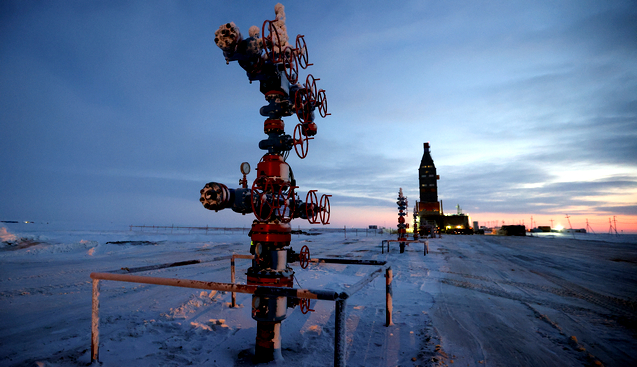Withdrawing from Russia may hinder plans to transition to clean energy.

|
|
Stanislav Krasilnikov\TASS via Getty Images
|
But experts say it’s unlikely these decisions will mean anything good for the transition to clean energy, and could actually set the companies back with their plans to achieve net-zero emissions. It started with BP.
Last weekend, under pressure from the U.K. government, the British oil giant decided to exit it’s nearly 20 percent stake in the Russian company Rosneft.
Russian crude makes up about a third of BP’s oil production, and the company said it would take a financial hit of as much as $25 billion.
In a statement, BP Chair Helge Lund said, “The Rosneft holding is no longer aligned with BP’s business and strategy.”
Shell, Exxon, and the Norwegian oil company Equinor have since followed, withdrawing from various joint ventures in oil and gas projects in Russia.
While abandoning oil and gas production is exactly what climate advocates want these companies to do, the moves do not represent a shift in strategy for Big Oil.
For one thing, when BP first announced its plans to achieve net-zero emissions in 2020, the company made it clear that the plan did not apply to its stake in Rosneft.
Now, the exit from Russia might actually hurt that plan, according to Jonathan Elkind, a senior research scholar at Columbia University’s Center on Global Energy Policy.
Both BP and Shell have said they planned to fund their forays into clean energy with profits from the fossil fuel side of their businesses.
“So this creates, at a minimum, a crosswind that they have to figure out a way to manage,” said Elkind, referring to the two companies’ exit from Russia. “That may translate into a need to rethink some of what their priorities had been.”
In other words, the situation in Russia won’t stop demand for fossil fuels, and major oil companies may decide to replace their Russian investments with new oil and gas ventures elsewhere.
According to the International Energy Agency, Russian oil and gas production is not the most carbon-intensive in the world, but it’s also not the cleanest.
If this leads BP, Shell, or Exxon to move into parts of the world with dirtier production, their emissions could increase.
It’s also unclear whether oil companies will be able to sell off their Russian assets or if they’ll be forced to walk away from them.
Even if they are able to sell assets, the proceeds may not be put toward clean energy.
When Shell sold off its assets in the U.S. Permian Basin last year for $9.4 billion, it said that it would spend some of the cash for the energy transition, but returned $7 billion of the proceeds to shareholders.
“There’s not generally a straight line you can draw from oil majors selling out of oil and gas plays to buying into clean energy,” said Lorne Stockman, research co-director at the advocacy organization Oil Change International.
Stockman also takes issue with the idea that BP and Shell need oil and gas funds to transition to clean energy.
“Companies that are in the clean energy business don’t need to run that business off of fossil fuel profits. There’s a thing called credit markets. You can get loans. You could issue shares. There are many ways to raise money to invest in clean energy,” he said.
Another question is whether Big Oil’s withdrawal of capital, and the technical expertise that comes with it, will have consequences for Russia’s plans to expand oil and gas development in the Arctic Circle — development that has been made possible due to climate change’s rapid warming of the area.
For example, Rosneft is building a multi-billion dollar oil production and export hub called the Vostok Oil project on the Taymyr peninsula, threatening a fragile ecosystem and the Indigenous communities that depend on it.
On Wednesday, a key international investor in the project, Trafigura, said it was reviewing its stake.
Elkind said it’s hard to tell whether the withdrawal of investment and trade ties with Russian companies will be a short-term phenomenon or more enduring.
But another factor is whether Russia can complete a project like Vostok without technological support from the West.
“All of this would create headwinds for Vostok,” he said. “Whether they can be overcome by Rosneft, it is too early to tell.”
Links
- Shell joins BP in selling Russian assets as pressure on Kremlin-linked firms grows
- Exxon to leave Russian energy project, halt new investments in the country
- Methane Tracker 2021
- Mega oil project in Russia’s far north threatens Arctic indigenous communities
- BP to Exit Rosneft Stake and May Take a $25 Billion Hit
- Russia's Ukraine Invasion and Climate Change Go Hand in Hand
- How the war in Ukraine and climate change are shaping the nuclear industry




